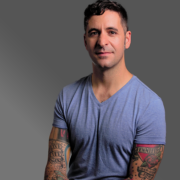This is what cancer looks like | Angelo Merendino
A few months after my wife was diagnosed with metastatic breast cancer, we realized that many people didn’t understand how serious Jen’s illness had become. So, I turned to my camera and began to photograph our day-to-day life. Our hope was that if family and friends saw what we were facing every day, then maybe they would realize how much we needed their support. They didn’t have to say the right thing; there isn’t a right thing to say. The experience is different for every person and different every day. We just needed them to be there—not to be silent.
Five months after we were married, my wife went in for a routine physical. Jen had had a lots of scares, but the “hard lump” had always turned out to be a cyst. This time she sensed there was something different in her GP’s demeanor. She got a mammogram, and the tech made adjustments, took lots of images. That alarmed her. Then the doctor walked in the room, which had never happened before. She said, We’re pretty sure this is cancer. It was: stage 3B.
Jen had a double mastectomy. She didn’t want a lumpectomy, she wanted the cancer gone. The surgery showed the cancer had spread to her lymph nodes. She had reconstructive surgery and chemotherapy, followed by radiation, all of which wrapped up around our one year anniversary. As far as the doctors could tell, there was no discernable cancer left in her body. That year had been overwhelming. There are so many things you don’t understand and so many words you can barely pronounce and on top of that you are in shock. The ideal thing would be to have a secretary with you at all the doctor’s appointments, because it is so hard to keep up with it all. But at least it was behind us.
Of course, Jen was on hormone therapy and having regular scans. Then in April of 2010 a scan showed that the cancer had metastasized to her liver and bone. I didn’t understand what metastatic breast cancer meant. I didn’t realize breast cancer could travel to other parts of your body. I thought maybe it meant she had liver and bone cancer now.
Our oncologist was really very special. She kept us as calm as possible. The initial cancer was small, so the idea was to find a chemotherapy that would keep the cancer from spreading. It was hard to accept that that would be considered a victory, that there would always be cancer in Jen’s body, that until there is a cure she would always receive treatment, that there was no not being in Cancerland.
The cancer started to spread. Soon, Jen was on methadone for pain. She was on a walker at age 39. And there was nothing I could do to make her better. I felt like a puzzle made up of pieces that didn’t make sense.
Meanwhile, most of our family and friends had no idea how to act around us. Communication evaporated. A lot of people were in denial; they didn’t understand that Jen’s life was coming to a close. But when they fell silent, it made us feel like Jen’s life didn’t matter to them. We were exhausted. Jen felt alienated from everyone around her. I was facing being a widower before I was 40. We needed help.
And so I took out my camera and photographed our life. We wanted our friends and family to understand what we were going through. It’s not always easy for people to read our story and see the photos. The pictures don’t pull any punches. I took the photos and I lived with Jen’s pain and they still aren’t always easy for me to see. But we were fortunate that people were willing to listen. And the most important thing happened: Our family and friends rallied to be by our side.
On December 22nd, 2011, at 8:30PM, just 16 days after her 40th birthday and less than five years after our wedding, my sweet Jennifer passed. She used to say, Love every morsel of the people in your life. Because of her courage in sharing her story, more people understand the importance of showing that love, every day.




